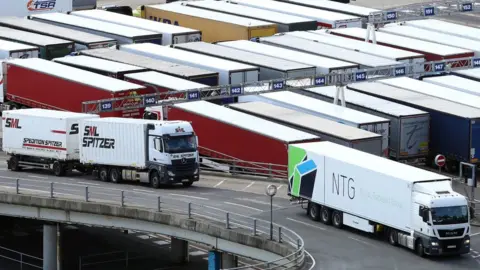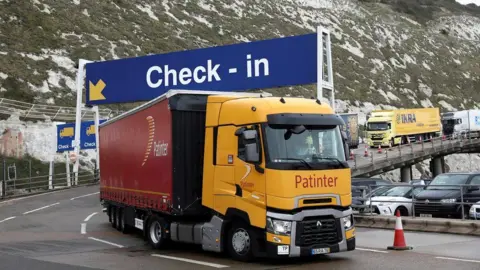British exports worth billions have faced EU tariffs since Brexit
 PA Media
PA MediaBritish exports worth billions of pounds have faced tariffs on trade with the EU since Brexit, according to an analysis of official EU statistics.
Despite the tariff-free deal agreed with the EU, a study by the University of Sussex found up to £3.5bn of British exports had taxes applied.
That accounts for about 10% of British goods exports to the EU.
Some firms paid due to the complexity of claiming zero tariffs, or said they planned to reclaim the fees later.
For exporters, maintaining zero tariffs under the post-Brexit deal is not automatic: it needs to be claimed on customs declarations that from January have had to accompany every export to the European Union.
An analysis for the BBC, by the University of Sussex's Trade Policy Observatory, used European customs data from these declarations.
The figures indicated that between £2.5bn and £3.5bn of British exports faced a tariff in the first three months of 2021.
The European Commission confirmed that according to data collected by its customs authorities, €2.5bn of eligible UK exports did not use the zero-tariff agreement.
"Tariff-free trade is only tariff-free if firms not only meet the rules of origin criteria, but also can deal with the necessary bureaucracy and paperwork," said Prof Michael Gasiorek, trade expert at the University of Sussex.
"What this analysis shows is that in the first quarter, around 27% of trade that could have entered tariff-free did not do so.
"In some sectors and for some firms, this will no doubt improve, but it reflects the reality that leaving the EU has imposed real costs on firms, with long-term implications for trade and production."
The data covers all British exports to the EU in January and February, and some reporting nations in March.
Individual businesses and groups told the BBC of instances where millions of pounds in tariffs had been paid.
Most put this down to complex arrangements for claiming zero tariffs, difficulties over the re-export to the EU of goods processed in Britain, and an expectation that some of these fees could eventually be recovered. Some of the world's biggest multinationals have paid seven-figure tariff bills.
Rare vehicles
A classic car repairer, The Classic Car Mechanic, showed tariff bills of hundreds of pounds for car parts for rare vehicles sent to Hungary, which could not be valued, and so were hit with a tariff by French customs.
"We've had to pay a tariff, even though we've got a zero tariff," said the boss of the business, Simon Spurrell.
"It's the same with all the other shipments, all UK origin parts, but they dispute it and they hold it up.
"We feel that we have no fight left in us, we have to then, as a small organisation just say, well, we'll cut our losses, and just pay the duty."
The Trade Policy Observatory has tried to quantify the effect of extra trade barriers with the EU on different sectors.
Although exports began to recover from a massive drop in January, over the quarter, the Observatory calculated that, of the worst affected sectors, textiles saw exports fall 63%, food suffered a 36% drop, and the automotive industry saw exports down 20%.
Other advanced manufacturing industries have not been affected, according to the analysis, which seeks to isolate the impact of post-Brexit barriers from the impact of the pandemic.
A government spokesperson said: "The vast majority of traders have adjusted well to our new trading relationship with the EU.
"HMRC continues to work closely with exporters to ensure they correctly apply rules of origin requirements and are aware of their right to refunds.
"The unprecedented zero-tariff zero-quota deal we secured with the EU allows businesses to trade smoothly, while we can now regulate in a way that suits the UK economy and our businesses - doing things in a more innovative and effective way, without being bound by EU rules."
 Getty Images
Getty ImagesThe analysis also showed that in the early months of the deal, there were some marked differences between EU nations in the extent of use of the free-trade deal for imports of British goods.
Data for what is known as "preference utilisation" of British exports to Germany shows rates well below half in January and February at 42% and 44% respectively. The trade deal has been used more, according to the data, for exports to France, reaching 77% in March.
Preference utilisation rates (PURs) measure the extent to which tariff preferences provided by a particular trade agreement are being used by imports and exports of either side.
European Commission sources stressed that overall use of the deal was in line with the first months of other free-trade deals and that it would take some time to assess the impact.
UK government ministers told Parliament last month that they would be releasing their equivalent data for EU exports into Great Britain shortly.
